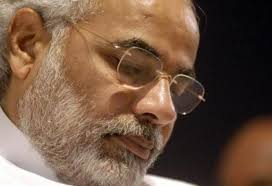
The party leaders even suggested that the BJP had committed "political suicide" by nominating Modi PM candidate after leaders like Atal Behari Vajpayee and LK Advani were rejected by people of the country.
Criticizing Modi for his "I, me, myself" style of functioning, Congress leaders also reminded that unlike the Gujarat chief minister, Congress vice-president Rahul Gandhi takes everybody along and delegates responsibilities while not offending any section.
Terming Modi's ambition as a pipe-dream, commerce and industry minister Anand Sharma said, "... That shows that he is delusional, he is desperate.
"I can say that with certainty that he will always be speaking from the ramparts of replicas and not from the real Red Fort and not address the real Parliament that is for sure because that misfortune will never visit people of India."
Congress leader Mani Shankar Aiyar said the BJP will significantly contribute to the formation of UPA-III by deciding to project "so divisive a person as Modi".
"He (Modi) is so divisive that even his own party ranks are riven with dissent over his choice. In the nation as a whole, he has polarised the conflict between communal and secular forces. But, if the BJP chooses like lemmings to commit political suicide who are we to object," Aiyar said.
Congress general secretary Shakeel Ahmed said, "People of the country rejected Vajpayee after six years. Advani was also made the BJP candidate but people of the country rejected him and made him sit at home. Maximum dispute on Modi's name has come from BJP itself. The country will witness what happens to him in 2014."
Another Congress leader Rashid Alvi said under directions of RSS, BJP announced Modi PM candidate despite opposition from various senior leaders.
"It is impossible for Narendra Modi to become Prime Minister. But in case he takes over our country, then it will be the last democratic election because he does not believe in having democracy. Senior leaders of BJP know this but are somehow quiet in saying so," Alvi said.
He said Modi has just replaced LK Advani "who was Prime Minister-in-waiting for ten years. My best wishes to Modi to continue as PM-in-waiting for 10 years."
Comparing Rahul Gandhi's working style and personality to that of Modi, rural development minister Jairam Ramesh attacked the Gujarat chief minister saying he harps on "main, main, main" (I, me, myself).
"Kuch log hamare desh main, hamesha main, main hi karte hain ... maine vo kiya, main vo karunga. (Some people in our country harp that I did this, I did that. I will do that ... )", Ramesh said.
He added, "Second style is of Rahulji's personality. He is different, cool ... he who does his work very quietly. He will listen to every one, take his/her advice patiently. He is not aggressive or offense a person. He delegates responsibilities."
Referring to Modi, he said, "He thinks no one can do that work in the world. The world starts from him, and ends with him ... They have got solutions to every problem in the world."
Taking a dig at the Gujarat chief minister, Sharma said he has never shown any grace or dignity in the political discourse.
"Humility has never touched him and he has dragged political discourse to very low depth," he said.
Another Congress leader Abhishek Singhvi dismissed as "false equation" BJP's attempt to project the Lok Sabha poll as a Rahul Gandhi vs Narendra Modi affair.





Comments
Add new comment